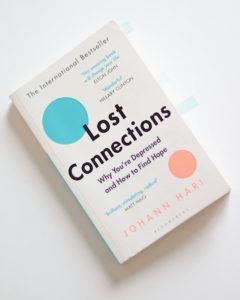
Lost Connections: Why You’re Depressed & How To Find Hope — A Book Summary

It’s not very often I come across a book, and thought “This is probably one of the best books I’ve ever read in 2020, and it’s not even the end of the year!”. Because that’s exactly how I felt when I stumbled upon this book.
More than ever, depression is getting rampant in today’s society. According to the National Health and Morbidity Survey 2017, the prevalence rate of population with depression among those aged between 13 and 17 in Malaysia is a whopping 20% (1 in 5).
But what if I told you that the information we have about depression and anxiety are not entirely true? What if depression is not due to a chemical imbalance in your brain? What if I told you that there is no real evidence behind the efficacy of antidepressants? What if I told you that probably the best treatment for depression is not even medication at all?
This blog post is meant to be a summary based on my own personal understanding and takeaways from the book. I’d suggest that you take it all with a grain of salt, but if this post motivates you to do your own research, then I’ve done my part.
Throughout the book, Johann Hari (the author) uses his training as a sociologist to explore how the Western world and the way we currently live have left more and more people depressed. Hari was diagnosed with depression in his 20’s and began taking antidepressants. After 10 years of his doctor upping his dosage, he came to the max dosage, but strangely enough, the depression continues to linger. From then on, he began his own extensive research on depression and was shocked by what he found.
After reading Lost Connections, I’ve come up with 4 summaries that I’ve gained from the book:
SUMMARY #1: A CHEMICAL IMBALANCE DOESN’T CAUSE DEPRESSION
Contrary to popular beliefs, depression is not a result of brain malfunction, serotonin deficiency or some other glitch in your mental hardware. For a long time, we were told to believe that depression was due to a deficiency of a specific hormone in your brain called serotonin. Some described it as your “feel good” hormone.
Professor David Healy has written the most detailed history of antidepressants, stating that there is no evidence to show that depression is due to low serotonin. The fact has never been discredited because it didn’t ever get credited. In the biggest study of serotonin’s effects on humans, it found no direct relationship with depression. Professor Andrew Skull of Princeton has said that attributing depression to low serotonin is “deeply misleading and unscientific”.
But how did this information come about in the first place?
The serotonin myth appeared as an “accident in history” in 1952, when a new drug called Marsilid (Iproniazid) was thought to treat tuberculosis, only to find that patients suddenly became more joyful, euphoric and inappropriately happy after consuming it. In view of that discovery, they started prescribing it to depressed patients instead. The drug seemed to have a similar effect on them for a short period. As a result, drug companies started to take advantage over this information. The idea that depression is due to low brain serotonin is easier to grasp by the masses. Thus, the only way to reverse this chemical imbalance is by taking drugs that can rewire the brain.
Statistics show that half of the patients became depressed/anxious again within a year of taking antidepressants, requiring them to up their dosage.
This begs the question: How effective are antidepressants, really? And are they worth taking, considering the extreme side effects that they produce, such as weight gain, diaphoresis (profused sweating) and sexual dysfunction?
SUMMARY #2: THERE IS NO SOLID AND RELIABLE EVIDENCE ON THE EFFICACY OF ANTIDEPRESSANTS
In the mid – 90s, Harvard professor Irving Kirsch took a closer look at the research on antidepressants. What he found was that many antidepressants on the market were no more effective than placebos.
It is no secret that most drug companies often run trials on their own products. A vast majority of research on drug efficacy is funded by big pharmaceutical companies and they are done for specific reasons: They want to be able to market the drugs and make profit out of them. Kirsch discovered that the clinical tests pharmaceutical companies published were routinely skewed toward getting their medications released. Some even conduct their research in secret to selectively handpick studies and make rival drugs look worse, eventually overthrowing competitors. This results in a publication bias.
Of all the studies that drug companies do, 40% are never released to public, with negative findings scrapped off from papers, so that only research publications with successful clinical trials are released.
As University of London professor Joanna Moncrieff told Hari, when it comes to anxious and depressed brains, “There’s no evidence that there’s a chemical imbalance.”
SUMMARY #3: THERE ARE 9 COMMON REASONS FOR DEPRESSION
We were often fed with the notion that depression has more to do with problems in your brain — an abnormal brain structure, chemical imbalance, genetic influence, inheritance etc. So I was genuinely surprised to discover that out of the 9 reasons for depression, 7 are due to environmental factors: A result of long — term, accumulative stressors or difficult life circumstances, often with poor social support.
Here are the 9 reasons for depression:
Reason #1: Disconnection from meaningful work.
“When work is enriching, life is fuller and that spills over into the things you do outside work”. — Dr Michael Marmot
A study done between 2011 and 2012 by the polling company Gallup over millions of workers across 142 countries revealed results that were mind boggling: 13% are engaged in their jobs (enthusiastic about, and committed to their work, contribute to organization in a positive manner), 63% are not engaged (sleepwalking through their workday, putting time – but not energy or passion into their work) and 24% are actively disengaged (unhappy at work, busy acting out their unhappiness).
This shows that more than half are unsatisfied with their work! But why is that so? Not surprisingly, work that is monotonous, boring and soul-destroying often cause this. We need to do work that gives us meaning and purpose.
Studies also show that a lack of control in work (especially those in the bottom ranks) and feeling of disempowerment often leads to more stress, and eventually depression. This is also triggered by a lack of balance between efforts and rewards — when the hard work done is not acknowledged, which in turn produces a feeling of irrelevance in the workplace.
Reason #2: Disconnection from other people.
Sadly, loneliness has become an epidemic. I can assume that many of us are struggling with this as well behind closed doors, myself included. So, this topic hits me personally.
Interestingly enough, loneliness is the equivalent of being in a fight or flight mode, or in simpler terms, a stressful situation. This leads to a surge in cortisol level (stress hormone), resulting you to be hypervigilant because your primitive brain thinks that you’re under attack and there is no one to protect you. A study done showed that disconnected people are 3 times more likely to catch a cold compared to those who have lots of close connections to others.
Lonely people are often anxious, have low self-esteem, are pessimistic and are afraid other people will dislike them.
What I find fascinating is that there is a difference between objective connections and perceived connections. You can talk to so many people everyday — and still feel lonely.
Loneliness isn’t the physical absence of other people, per se. It’s the sense that you’re not sharing anything that matters with anyone else. To end loneliness, you need other people: To feel that you are sharing something with the other person, or group — something meaningful to both of you. A one – way relationship doesn’t cure loneliness. Only two – way (or more) relationships can do that.
“The kind of connection we need is face-to-face, where we are able to see, and touch, and smell, and hear each other. We are social creatures”. — Dr. Hilarie Cash
Reason #3: Disconnection from meaningful values.
Our consumer – driven society, where we overvalue money and possessions, has left us detached from worthwhile values, and this contributes to depression.
Research shows that materialistic people, who think happiness comes from accumulating stuff and a superior status, had much higher levels of depression and anxiety.
There are two kinds of motives that govern our daily lives: Intrinsic motives and extrinsic motives. Intrinsic motives are things that you do purely because you value them, not because of anything you get out of them — your hobbies, interests or passion projects. Extrinsic motives, on the other hand, are things you do because of what you get out of them — money, superior status, admiration or sex.
“Materialism is KFC for the soul”. — Johann Hari
As human beings, we have certain innate needs — to feel connected, to feel valued, to feel secure, to feel we make a difference in the world, to have autonomy, to feel we’re good at something.
Materialistic people, or those who value extrinsic goals over intrinsic ones, are less happy because they are chasing a way of life that does a bad job of meeting these needs. They are also suffering from the presence of something — an incorrect set of values or junk values, telling them to seek happiness in all the wrong places, and to ignore the potential human connections that are right in front of them.
You need to pull yourself out of the materialistic environment and replace them with actions that are going to provide intrinsic satisfactions and encourage those intrinsic goals.
Reason #4: Disconnection due to childhood trauma.
A 1998 study found that the more traumatic a person’s childhood is, the more likely they are to have depression and anxiety.
Depression is a normal response to abnormal life experiences. It is not a causal explanation, it is a necessary intermediary mechanism. Most probably, depression and anxiety may be the sanest reaction you can have. It’s a signal saying, you shouldn’t have to live this way.
“When you have a person with extreme human distress, we need to stop treating the symptoms. The symptoms are a messenger of a deeper problem. Let’s get to the deeper problem”. — Professor Joanna Cacciatore, Arizona State University
Shockingly enough, it turned out that emotional abuse was more likely to cause depression than any other kind of trauma — even sexual molestation. Depression due to childhood trauma normally stems from feelings of unworthiness, the result of chronic emotional abuse and mental degradation.
“When people have these kinds of problems, it’s time to stop asking what’s wrong with them, and time to start asking what happened to them”. — Dr Anda
Reason #5: Disconnection from status and respect.
Stress level is raised when status is low and threatened. In areas with larger gaps in wealth, such as the US, there are higher rates in depression. The more unequal your society, the more prevalent all forms of mental illness are.
Reason #6: Disconnection from nature.
People who live in greener neighbourhoods feel less stress and despair than those who don’t. Scientific evidence is clear that exercise reduces depression and anxiety. This is because it returns us to our natural state. Research shows that just by taking a walk in nature shows a dramatic effect on mood and concentration by five times among depressed people.
After reading this chapter, I noticed that when you are depressed, you become trapped in your own story and your own thoughts. Everything is about you. By becoming depressed or anxious, you become a prisoner of your ego, where no air from the outside can get in. But a common reaction to being out in the natural world is a precise opposite of this sensation — a feeling of awe, realizing that the world is bigger than your problems, and that you’re just a tiny speck of dust in this boundless universe.
Reason #7: Disconnection from a secure and hopeful future.
An unstable economy, a chaotic political upheaval, toxic working environment, condemning policies, demotivating social circumstances, living in an uncertain and unpredictable future — all of these are big indicators of depression. A sense of a positive future protects you.
Reason #8: Genes.
Finally, we’ve reached the biological cause of depression.
We do know that there is a genetic influence in depression, though it only accounts for 37% of cases. Research has found that a particular flavor of 5-HTT gene can greatly increase rate of depression, but only in certain environments. Normally it would stay dormant, but situations such as terribly stressful environment or a great deal of childhood trauma can activate it.
Reason #9: Changes in the brain.
Neuroplasticity is how the brain changes from experience. It changes in response to signals from the world. Because of this, when people spend more time with thoughts of despair rather than joy, it can strengthen the negative feeling areas.
SUMMARY #4: WAYS TO OVERCOME DEPRESSION AND ANXIETY
This goes to show that mental health is mainly produced socially, with genetics playing only a minute role. The presence or absence of mental health is above all a social indicator and therefore requires social, as well as individual, solutions. You are not suffering from a chemical imbalance in your brain. You are suffering from a social and spiritual imbalance in how we live.
“What if depression is, in fact, a form of grief for our own lives not being as they should? What if it is a form of grief for the connections we have lost, yet still need?” — Professor Joanna Cacciatore, Arizona State University
Theoretically, to overcome depression and anxiety is to reconnect all the disconnections mentioned above. Easier said than done, but one step forward makes all the difference, thus creating a compound effect of progress.
Tie yourself more deeply into collectives: With friends, with family, with causes bigger than yourself. Change your environment to prevent triggers that can cause depression — cut back on social media, stop watching TV with advertisements. Spend more time face-to-face with people you love, pursue careers that matter to you.
Share your traumas with someone you trust — close friends, partner, siblings, meet a therapist, join a social support group. When you lock it away in your mind, it festers, and the sense of shame grows, leading to depression and anxiety.
Stick to values that you stand by wholeheartedly. Spend less time puffing on your ego, seeking material possessions or seeking superior status. Start having sympathetic joy for others — to be genuinely happy for the other person’s achievements and earnestly care for one another.
Because in the end, when you look past all the achievements, the wealth, the fame and the success — we are all just creatures, who above all else, desire to love and to be loved.
“You aren’t a machine with broken parts. You are an animal whose needs are not being met. You need to have a community. You need to have meaningful values, not the junk values you’ve been pumped full all your life, telling you happiness comes through money and buying objects. You need to have meaningful work. You need the natural world. You need to feel you are respected. You need a secure future. You need connections to all these things. You need to release any shame you might feel for having been mistreated.” — Johann Hari


Hello! I am Christal
Interesting Posts


6 Reasons You Should (Consider) Quitting Your Job

10 Things I’ve Learned After Quitting Housemanship

Slowly Falling

12 Lessons I’ve Learnt In 2020

5 Things I Need To Change/Stop Doing in 2020
Twenty years from now you will be more disappointed by the things that you didn’t do than by the ones you did do.
- Mark Twain Tweet
Related Articles

5 Signs You’re In The Right Career

6 Reasons You Should (Consider) Quitting Your Job

6 Steps To Take If You’re Planning To Quit Your Job

